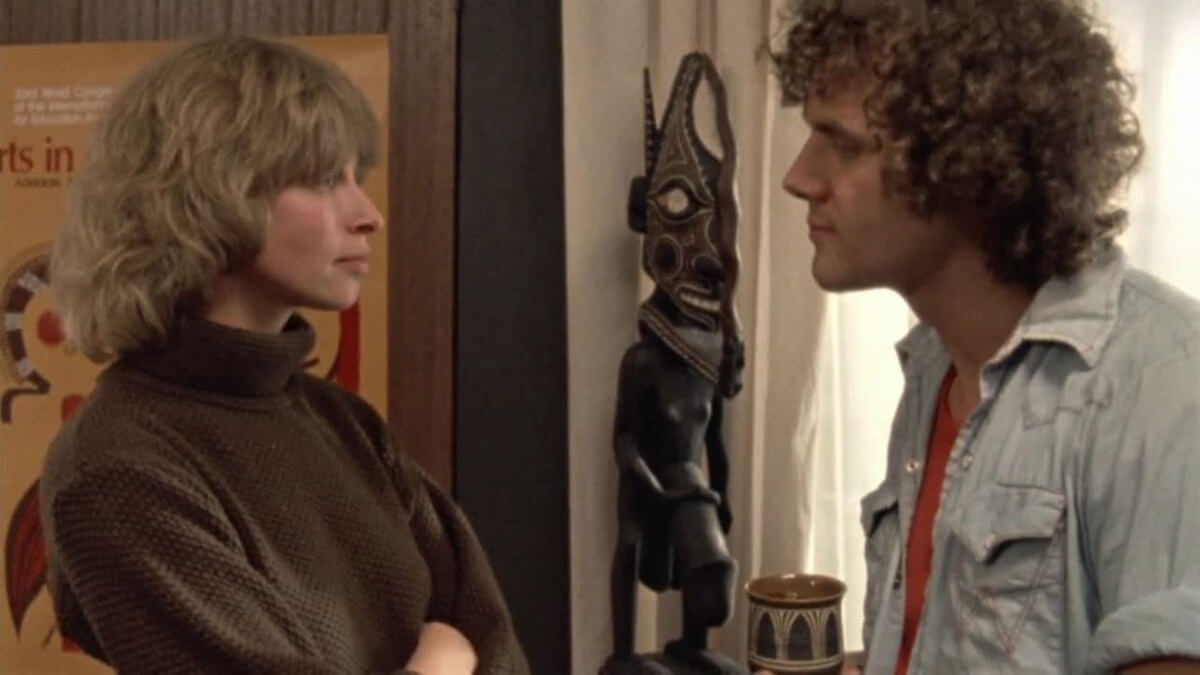Welcome to X-R-A-Y Specs, a film roundtable in which four of our radiological technicians converse about movies. This edition’s selection is The Plumber, a 1979 film made originally for Australian television by then-barely-known director Peter Weir. Our conversation follows.

Jillian Luft: Stoked to discuss this one with y’all. I watched The Plumber for the first time about a decade ago. I had just watched Picnic at Hanging Rock (1975) and rewatched Witness (1985). Naturally, I was crushing hard on Peter Weir’s yawning, gauzy dreamscapes. And, man, was I (pleasantly) surprised by this lil’ claustrophobic, mundane nightmare of a movie. Not at all what I was expecting and, yet, Weir’s signature is here…I think? He’s created otherworldly spaces within university housing, exploring characters’ interior worlds but constricting them to labyrinthine bathroom piping and the mythic aural battles of African music vs. rock-n-roll.
Also, this film is damn funny. It’s an amusing send-up of academia and marriage and masculinity and counterculture and fetishization of the “other.” What struck me most during this viewing is how the comedic beats still resonate. The central conflict could easily take place in a NYC apartment in 2024. Maybe the “Jill” character is a climate change activist interested in the work of Indigenous people and the plumber listens to Joe Rogan on his phone while she listens to NPR. Maybe she suspects him of being a member of Antifa and he makes cutting quips about her abundance of Native American pottery.
Rebecca Gransden: I wasn’t prepared for the level of sophistication at play in this film, but being an admirer of Peter Weir that was a mistake on my part. What I find most magnetic about his films is the way in which they inhabit a particular psychic register. With The Plumber he presents a work that seems to be taking a satirical look at liberalism in particular, and initially the academic couple reminded me of the “Juneteenth” episode of Atlanta. Jill and Brian are insulated by their position, but there is something more subtle worming its way through the heart of Weir’s film. Max’s class resentment takes shape in such an unusual way his character becomes almost a mythic archetype, a figure conjured up by the middle class unconscious to represent what they most fear, but dare not admit.
 The film started to make sense to me when I cast Max as acting out the methods employed by an occupying force. In this way, he attempts to give Jill and Brian a taste of their own medicine. This medicine is undeserved, but the unfairness of his targeting of them mirrors the random nature, the accident of birth, of being a citizen of an occupied nation. It’s tough luck. The scene where Jill is faced with the decision on whether or not to allow him access, as well as being extremely uncomfortable, can be viewed in this context. Max arrives with the persuasive argument that he can fix the place, a justification very often given by occupying forces when invading a nation. All it takes is for her to be caught off guard and he is given the opportunity to gain entry and take over the space. Jill’s area of study involves the examination of every part of human society and culture, including the most private areas. I don’t think Max’s colonization of the bathroom is an accident. It’s a place where we feel vulnerable, and many times we attach a lock to the door to prevent others from walking in unannounced. For me, this demonstrates the methods used by any occupying force: we can do what we want, go where we want, and you don’t have the power to do anything about it. Max makes his own study of the most private areas of Jill’s life, questioning her to the point where she feels deeply uncomfortable. He collects information on them, such as Brian’s hair loss treatment, that is invasive. But isn’t this what Jill does? She’s a serious academic, but her role is inherently parasitic. This is where Weir is at his best I think, as the satire is directed at the lack of self awareness displayed by both Jill and Brian, rather than a direct take down of their disciplines, which is a more complex issue.
The film started to make sense to me when I cast Max as acting out the methods employed by an occupying force. In this way, he attempts to give Jill and Brian a taste of their own medicine. This medicine is undeserved, but the unfairness of his targeting of them mirrors the random nature, the accident of birth, of being a citizen of an occupied nation. It’s tough luck. The scene where Jill is faced with the decision on whether or not to allow him access, as well as being extremely uncomfortable, can be viewed in this context. Max arrives with the persuasive argument that he can fix the place, a justification very often given by occupying forces when invading a nation. All it takes is for her to be caught off guard and he is given the opportunity to gain entry and take over the space. Jill’s area of study involves the examination of every part of human society and culture, including the most private areas. I don’t think Max’s colonization of the bathroom is an accident. It’s a place where we feel vulnerable, and many times we attach a lock to the door to prevent others from walking in unannounced. For me, this demonstrates the methods used by any occupying force: we can do what we want, go where we want, and you don’t have the power to do anything about it. Max makes his own study of the most private areas of Jill’s life, questioning her to the point where she feels deeply uncomfortable. He collects information on them, such as Brian’s hair loss treatment, that is invasive. But isn’t this what Jill does? She’s a serious academic, but her role is inherently parasitic. This is where Weir is at his best I think, as the satire is directed at the lack of self awareness displayed by both Jill and Brian, rather than a direct take down of their disciplines, which is a more complex issue.
Water plays a significant symbolic role in Weir’s films, and its use in The Plumber is as fascinating as it is crucial. After Max’s arrival and his subsequent bathroom plumbing renovations, there is the ever-present threat of flood, and the implication that his interference in the flat’s infrastructure is the cause, rather than the fix, of an oncoming deluge. When we take into account that ‘plumbing’ can be used euphemistically to describe the reproductive organs, his role takes on an even darker tone, considering the history colonizing forces have had regarding interference in the reproductive lives of those they are colonizing. His false claim of being imprisoned for rape, and then making a joke out of it, adds another layer to this aspect. This scene is shot interestingly by Weir, with Max’s face taking up almost the whole screen. It is confrontational and unapologetic. Max’s constant pushing of the boundaries in conversation, then minimisation and backtracking, make for anxiety-inducing suspense, and this psychological warfare ensures the film is tough and mesmerizing to watch, in equal measure.
So, given all that is happening, why doesn’t Jill leave?
Katharine Coldiron: Because she believes the space belongs to her. She’s enacting the exact kind of colonizing you’re talking about. The fact that she (really her husband) is renting the apartment, and that Max, as an employee, has more claim to the space than she does, conveniently escapes her notice. She acts with the certainty of the colonizer that she belongs here, and she refuses to give an inch.
I’m with you, Rebecca, in that I wasn’t prepared for how complex the social/power dynamics of this film were. I also wasn’t prepared for how utterly the initial problem of the film—when someone disrupts your peace for necessary work, and you have a limited set of available responses without acting like an asshole—would carry over 40 years later. Everything Jill experiences (in the first 20 minutes) is exactly how I felt when our apartment ceiling rotted through and we had people tramping in and out of there for weeks.
(I did not frame any of them for robbery, for the record. And I did often go to the library to do the work-from-home job I had at the time, instead of sitting in the apartment while they played loud music, which of course they did do.)
 Something I loved about this film was the moment Jill’s façade collapsed and she called Max a dirty tradesman, after specifically saying, earlier, that that wasn’t how people thought about such things anymore. I know she was pushed to some emotional limit, but I still enjoyed the admission that “enlightened” white people only paper over their racist, classist prejudices. I’d love to see Jillian’s version of this film, in which the NYC climate change activist snaps and calls the plumber white trash, or something worse.
Something I loved about this film was the moment Jill’s façade collapsed and she called Max a dirty tradesman, after specifically saying, earlier, that that wasn’t how people thought about such things anymore. I know she was pushed to some emotional limit, but I still enjoyed the admission that “enlightened” white people only paper over their racist, classist prejudices. I’d love to see Jillian’s version of this film, in which the NYC climate change activist snaps and calls the plumber white trash, or something worse.
Inevitably, Jill’s exposed prejudice leads the viewer to ask whether she’s equally contemptuous of her anthropological subjects. Whether that’s the dynamic at work in all anthropology. Whether rich, educated white people are simply awful. I love it.
Tex Gresham: I kinda thought about this as an anti-porno. All the ingredients were there for a cheap-plumber-cleaning-the-pipes VHS sex fantasy––lonely insular wife, brash tight-jeaned plumber, empty apartment. But when those ingredients came together they made something volatile and pukey, where the climax is the shedding of a social mask and the eruption of murky water. It was like Weir saw one of those pornos and said, “What if I made something like this but no one’s allowed to come and it’s kind of abusive?”
Because the whole thing, to me, was about a woman easing into an alternate (maybe truer) persona by finding her ability to counteract abuse. In the end, framing Max, that’s the only real move she had and she did so proudly, looking down on a man who, in most shots, was always looking down on her. Not really an empowerment story, but rather the story of a woman who has worn a mask of academic politeness and who sheds that mask in favor of someone who maybe shouldn’t be fucked with. Because Max was only there to do that – fuck with her. The kind of guy who blames everyone else for his problems when he’s around the right audience to share the blame, and is a charismatic charmer when he’s in the company of everyone else so they never know he’s an asshole. And with Jill, he targeted someone who he blamed and who he could, abusively, share that blame with. But really: she might be better off than Max classwise (and we only assume this cuz he’s a “plumber”) but she lives in an apartment.
I liked Jill. And sometimes The Plumber can be an asshole, if ya catch my drift.
Also and unrelated: these are my favorite kinds of movies––where an “insane” character torments a “sane” character until the roles become reversed (or embraced). This is another I’ll add to the list of favorites. And admittedly, I’ve never been a Weir fan, but again – this hit.
RG: The porn comparison is spot-on, Tex! Obvious when pointed out. It cannot be ignored that part of why Jill doesn’t leave is the implied sexual curiosity Max’s presence brings her. He fits the stereotypical idea of the ‘bit of rough’ and fetishisation of the working class is addressed directly in a conversation between Jill and her friend. Here, Max is described as a type (essentially buff pieces of lust meat) and objectified in a reductive physical way that isn’t so much a reversal of generally accepted gender norms on the women’s part, but a reflection of class attitude that has existed since time immemorial. That the film incorporates this into Jill’s personal struggle is to its great credit, as Weir manages to turn the work into a complex exploration of psychology and social dynamics, and avoids the simplification that often plagues social commentary. The film undertakes a nuanced examination of power, and taps into something that transcends sociological markers and unearths uncomfortable truths about human nature.
The film frequently reminded me of What About Bob?, where Bill Murray’s character slowly drives Richard Dreyfuss’ uptight therapist to distraction, while at the same time ingratiating himself into and charming the family. Max’s version of this character type possesses a more immediate malevolence, and the mystic aspect brings to mind a trickster spirit, whose devilry generates spiritual advancement in some way. I was also reminded of the vampire myth, as Max’s arrival at the door has parallels with the traditional rule of the vampiric, where the vampire is required to be invited in before it can enter. Perhaps there is something within Jill that welcomes a disruptive presence. I viewed her decisive act in getting rid of him as a Pyrrhic victory, as although she had achieved what was necessary for her personally, it signaled to me that the empowerment she was seeking was false, and they both end up trapped by the unassailable social forces they live under. It also led me to ask if Max was, in the end, right to give her hell, enact the chip on his shoulder, to such a distressing degree, as ultimately her social position will near always save her, and the real power is with her, whether she lives it out in her day to day existence or not.
JL: Tex, I’m so glad we’ve made a Weir fan of you! As Rebecca astutely noted, his films do reside on a specific mental plane. But Weir doesn’t invite the viewer to just coast on the vibes he’s creating. The vibes unsettle and infiltrate and escalate until the viewer is fully immersed and then firmly entrenched in the ambient heart of the tension. It’s a movie that’s hard to shake off long after watching–at least for me. Each time I see it, my worldview becomes a bit more dismantled, much like Jill’s bathroom. By the film’s end, that bathroom is the site of a realistic nightmare. A complex metaphor. A disaster. And I am all of these things, too.
 And yes, Tex! This movie, for sure, subverts porno tropes. On first viewing, I kept waiting for the fraught relationship to explode into something carnal. And I think Weir hopes the audience harbors these perverse expectations. In this way, we’re just as guilty as Jill for fetishizing the other. To anticipate a marital transgression is to other both Jill and Max, to stereotype them based on class and status. In this way, we are implicated from the start.
And yes, Tex! This movie, for sure, subverts porno tropes. On first viewing, I kept waiting for the fraught relationship to explode into something carnal. And I think Weir hopes the audience harbors these perverse expectations. In this way, we’re just as guilty as Jill for fetishizing the other. To anticipate a marital transgression is to other both Jill and Max, to stereotype them based on class and status. In this way, we are implicated from the start.
I’m digging how we all feel a bit differently about Jill. I lean toward Katharine’s assessment: Even if her colonizing mindset isn’t the result of explicit bias, it does call her work into question. While she may not be a white savior, her fascination with her subjects could be the result of exoticizing their way of life. Even by romanticizing their “primitive” customs, it’s all rendered a bit sketch.
Still, the movie allows us to poke fun at Jill and Max. At times, their interactions are quite humorous. During these scenes, I found myself lulled into a detached state, bearing witness to a comedy of manners, treating these two as anthropological subjects of intrigue. And then a scene later, wham!, Weir shakes up the vibes, and it’s all banging pipes and suspense and borderline terror. I’m forced back into their conflict and overcome with dread and paranoia. Is Max dangerous? And if I think so, what does that say about me? Is Jill a mid academic, hemmed in by heteronormative domesticity? Or should I treat her with less empathy?
The Plumber leaves me wading through the sewage of my implicit biases, my lived experiences, and the “uncomfortable truths” the film forces me to reckon with. By the film’s closing, my mind has been thoroughly fucked. And there’s no one I trust to call to “unfuck” it.
The Plumber is available to stream from the Criterion Channel.

